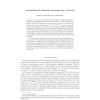Free Online Productivity Tools
i2Speak
i2Symbol
i2OCR
iTex2Img
iWeb2Print
iWeb2Shot
i2Type
iPdf2Split
iPdf2Merge
i2Bopomofo
i2Arabic
i2Style
i2Image
i2PDF
iLatex2Rtf
Sci2ools
241
click to vote
IACR
2011
2011
Approximate common divisors via lattices
We analyze the multivariate generalization of Howgrave-Graham’s algorithm for the approximate common divisor problem. In the m-variable case with modulus N and approximate common divisor of size Nβ, this improves the size of the error tolerated from Nβ2 to Nβ(m+1)/m , under a commonly used heuristic assumption. This gives a more detailed analysis of the hardness assumption underlying the recent fully homomorphic cryptosystem of van Dijk, Gentry, Halevi, and Vaikuntanathan. While these results do not challenge the suggested parameters, a 2 √ n approximation algorithm for lattice basis reduction in n dimensions could be used to break these parameters. We have implemented our algorithm, and it performs better in practice than the theoretical analysis suggests. Our results fit into a broader context of analogies between cryptanalysis and coding theory. The multivariate approximate common divisor problem is the number-theoretic analogue of noisy multivariate polynomial interpolation...
| Added | 23 Dec 2011 |
| Updated | 23 Dec 2011 |
| Type | Journal |
| Year | 2011 |
| Where | IACR |
| Authors | Henry Cohn, Nadia Heninger |
Comments (0)

